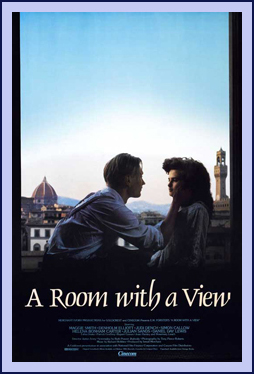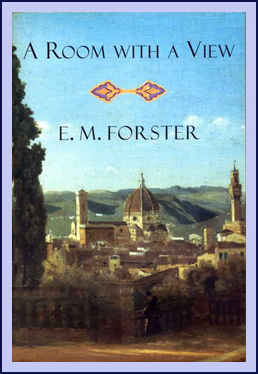Movie Review - A Room with a View
 A Room with a View
A Room with a View
Based on the book by E.M. Forster
Starring: Elaine Cassidy, Rafe Spall, Laurence Fox, Timothy Spall, Timothy West, Sinéad Cusack, Elizabeth McGovern, Mark Williams, Sophie Thompson, and Tom Stewart
Release Date: November 4th, 2007
Rating: ★★★★★
To Buy
Lucy Honeychurch and her chaperon, cousin Charlotte, are in Italy to be tourists. But the pension they have chosen is letting them down. They were promised a room with a view. Well, the room has a sort of view, not the kind they were expecting. At dinner their grievances are met with a solution, a father and son, the Emersons, have offered their rooms to the two women. Charlotte thinks this is beyond the pale and insists they switch pensions first thing in the morning. But the arrival of Mr. Beebe, a clergyman they know and respect, means they rethink their decision to leave, and Lucy convinces Charlotte with the help of Mr. Beebe to rethink the Emersons's offer. As Lucy awakes that first morning in Florence, it's to a glorious view. Lucy is very proper and polite and does all the things that tourists should do, but as Mr. Beebe notices when she plays the piano, there is something in her that is very exciting. Lucy isn't the staid Edwardian that she seems. This hidden nature of hers is very much in line with the outspoken Emersons, and before Charlotte whisks them off to Rome practically in the middle of the night, Lucy will share a kiss and maybe her heart with the young George Emerson. But in Rome she is reintroduced to Cecil Vyse, an opinionated and upright Englishman, but opinionated in all the right and not outspoken ways. Lucy eventually condescends to marry Cecil when they are back in England, but the arrival of the Emersons into their small little community is going to change Lucy's life forever.
After watching so many confined and staid and uptight and stagy adaptations of Forster's work it was such a relief to watch one that has real passion. An adaptation that could move you literally to tears. While there might be those who criticize Andrew Davies's adaptation for playing fast and loose with the storyline, I counter that he cut to the quick of the story and kept that which was vital intact. If you weren't a Forster purist or had never read the books, just watch the old Merchant and Ivory adaptation and then watch this one, it is without a doubt that this version makes a better film. That is what it comes down to in the end, which is the better movie, and this one will always win, even with the weird transfer error of blurred behinds and a lackluster score. What I think made this version work was that, like the book, the integration of Lucy's piano playing as a window to her soul was actually incorporated throughout the movie. Instead of a few set pieces with Helena Bonham Carter rigidly sitting at a piano and obviously not knowing what to do, here Elaine Cassidy throws herself into the music and bares her soul. It is distinctly a plus that you can actually see that she is playing the music, even if the ADR team might have dropped in a more accomplished version later. One can not stress enough that to make a good movie you have to connect with your audience, and this connected with me, with passion and empathy and yes, love, and sometimes it hurts.
All the feels in this movie just made it more real, more human, more alive. There's affection and attraction. If you look at the kiss between George and Lucy in the Merchant and Ivory adaptation, it's like watching two people who don't even like each other being yelled at by the director to kiss and they are going to try to stop the inevitable for as long as possible. That kiss is painful to watch. Here, well, the kiss is painful to watch for different reasons. There is abandon and discovery in it. True feeling. True connection. It's joyous. In fact, I would say that is what is at the very center of this adaptation, there is joy. Life is breathed into the story and we connect to it because it's joyous. There's this message that we are to live life now. Live for today. Don't settle, don't do what you think is expected of you. Don't go for the passionless Cecil, go for the man who makes your heart race as he sneaks a kiss behind the bushes. In this version by downplaying Cecil and actually giving George all his lines you actually connect to George in a way Forster wanted you to but was never quite able to accomplish. The speech that George gives to Lucy and Charlotte in the dinning room before he is banished from Windy Corner makes you realize how they are meant to be. I was like Charlotte, in the corner weeping, because this is what love looks like. You fight for it, you make your case, you don't go off like a wounded dog wrapped in a blanket in a carriage.
Yet, all the success of the Emersons comes down to the genius who cast the Spalls as father and son. By having an actual father and son play these characters you don't get that weird disconnect between father and son that Denholm Elliott and Julian Sands had. They felt like strangers, and Julian was way too posh. Here you not only see their love for each other, but they are able to play off each other, have the same inflection in their voices, the same infectious grin. They are true kindred spirits and by having this love offscreen it bleeds over into the film. It doesn't hurt that both of them are superb actors, in fact can we perhaps get Timothy some more well deserved awards STAT? As for Rafe, I've talked about my love of Rafe before... But seriously, now and forever, they are the Emersons for me. You love Mr. Emerson for his sweetness, his befuddled charm, his strong opinions and his belief that love conquers all. And George, I can understand why Lucy would love you, I love him watching this adaptation. He is a good man with a big heart and that grin. I'm sorry, but that grin could steal anyone's heart. He exudes vulnerability and likability and you can't help but love him. Whereas Julian Sands, I can never nor will never get that. There isn't anything inherently likable about him that makes you want to take him home and never let him leave. But Rafe, he is a good man.
This likability combined with this seize the moment and live your truth today feeds into the coda that Andrew Davies created. Now a LOT of people have expressed their displeasure about the coda, which isn't really a coda so much as a framing device for the entire story. Andrew Davies has written it so that George dies a hero in the first world war and that Lucy has come back to Italy to remember the good man that she loved. Hue and cry from all around. Firstly, have these people read the real ending that Forster tried to omit later? The one where George is a conscientious objector and then cheats on Lucy? Um, I don't think so. So right there, this ending is better, love till death do they part and all that. Secondly, Forster loves his tragedies in his final act, to leave the reader with a little slice of life and a lot of what the fuck. He had apparently toyed with the idea of killing George and having a rather different ending. Perhaps that is why in the book the ending doesn't quite work. There's something off with it. He could never get it quite right so he seems to have given up. This ending fixes that imperfect fit. Yes, it's sad. But the melancholy has a truth to it. This makes the story something more. Something greater. It's a true love story that lasted as long as it could, but reality gave us that final gut punch that Forster loved so much. Yet Lucy, while sad, is still happy, in her way. She knows that she loved a good man, that she lived the life she was meant to have, even if she was only able to hold on for a short time. It's truth and love at it's most human level.
But I really want to know, what is it about Andrew Davies that he just knows? He just gets how to streamline a story, how to take something that is good or near prefect and make it perfection. His unerring eye as to what needs to be kept and what needs to be ditched and how to sum up something that was long winded but still keeps it's essence with just a few words? Of the twenty-eight adaptations of his I have watched, I only disliked six of them, and none of the problems I had with those could be laid at his feet. Well, maybe B. Monkey, because he wrote the book as well.... But still, of my favorite miniseries of all time, almost ten of those were done by him. Is he some sort of magical adaptation fairy that comes along and sprinkles pixie dust on the production so that it will be perfect? Does he have a knack for channeling the authors and just knowing how they'd write it and exactly in what way with the perfect cadence? I remember in one of the adaptations I didn't care for, Tipping the Velvet, the one thing that really added to the miniseries was the music hall songs. Watching the extras on the DVD I found out that all the songs were Andrew Davies's idea AND he wrote them all. He is a genius and has the special power of just knowing. He gets it. That is why I think he should be the only one to adapt certain pieces of literature, and I for one am beyond gleeful that one of the pieces he did adapt was A Room with a View.




























































 The Doldrums by Nicholas Gannon
The Doldrums by Nicholas Gannon A Room with a View
A Room with a View A Room with a View by E.M. Forster
A Room with a View by E.M. Forster This Monstrous Thing by Mackenzi Lee
This Monstrous Thing by Mackenzi Lee Howards End
Howards End  Howards End by E.M. Forster
Howards End by E.M. Forster Driving Heat by Richard Castle
Driving Heat by Richard Castle Maurice
Maurice Maurice by E.M. Forster
Maurice by E.M. Forster A is for Arsenic by Kathryn Harkup
A is for Arsenic by Kathryn Harkup


















